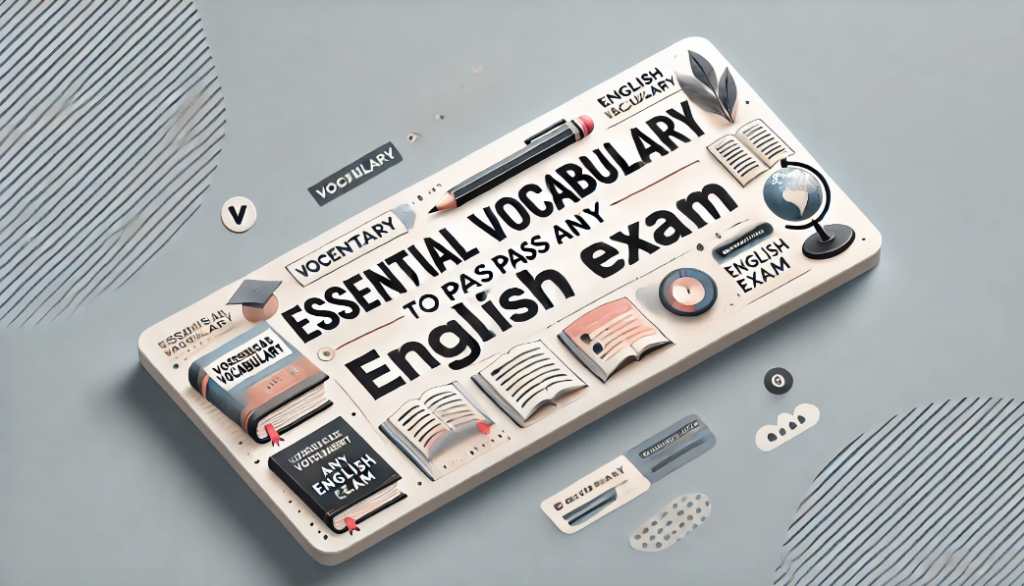Preparing for an English exam can be challenging, especially when it comes to mastering vocabulary. Whether you’re aiming to ace the TOEFL, IELTS, or the Global English Test (GET), having a strong vocabulary is essential. In this blog post, we’ll cover the essential vocabulary to pass any English exam and give you tips on how to expand your word knowledge efficiently.

Why Vocabulary is Important in English Exams
Vocabulary plays a critical role in all aspects of language proficiency tests: reading, writing, speaking, and listening. A rich vocabulary enables you to understand reading passages, articulate thoughts in essays, and comprehend spoken language effectively. Test-takers with an extensive vocabulary often score higher because they can express their ideas more clearly and accurately.
Key Vocabulary Categories for English Exams
Here are the most important categories of vocabulary you should focus on to pass any English exam:
1. Academic Vocabulary
Most English exams include academic topics like science, technology, and education. Knowing academic terms is crucial for both reading comprehension and essay writing.
- Examples: hypothesis, analyze, interpret, evaluate, concept, research, data, theory, objective, statistics.
Tip: Familiarize yourself with common academic word lists like the Academic Word List (AWL).
2. Transition Words
These words help connect ideas in your writing and speaking, ensuring your arguments are cohesive and well-structured.
- Examples: moreover, furthermore, consequently, nevertheless, in contrast, however, on the other hand.
Tip: Practice using transition words in sentences to ensure smooth flow in essays and speaking tasks.
3. Synonyms and Antonyms
Examiners look for a range of vocabulary. Instead of repeating simple words, use synonyms to show a varied vocabulary. Similarly, antonyms help you demonstrate nuanced understanding.
- Examples:
- Synonyms: good (excellent, beneficial, advantageous), bad (harmful, detrimental, disadvantageous).
- Antonyms: happy (sad, miserable), increase (decrease, reduce).
Tip: Keep a list of common words with their synonyms and antonyms and practice them daily.
What’s your English level?
Discover your level now: A1/A2/B1/B2/C1/C2 and GET your certificate!
4. Collocations
Collocations are word combinations that frequently occur together. They show a deeper understanding of language structure, which is key in writing and speaking exams.
- Examples:
- Make a decision, take responsibility, give advice, have an impact, deeply regret, strongly suggest.
Tip: Use collocation dictionaries or online resources to study frequent word pairings.
5. Formal vs. Informal English Test Vocabulary
Understanding the difference between formal and informal language helps in both writing and speaking tasks, as each requires a different tone.
- Examples:
- Formal: request, purchase, inquire, significant.
- Informal: ask, buy, find out, big.
Tip: Tailor your language to the test section: use formal language in essays and letters, but switch to informal for conversational tasks.
How to Expand Your English Test Vocabulary Efficiently
1. Read Regularly
Reading a variety of texts—academic articles, newspapers, and literature—exposes you to new words in context. Pay attention to unfamiliar words and note them down for later review.
2. Use Flashcards
Flashcards are an effective way to memorize vocabulary. Apps like Anki or Quizlet can help you track your progress and ensure regular practice of new terms.
3. Practice Vocabulary in Context
It’s important to not just memorize words but understand how they are used in sentences. Write your own sentences with new vocabulary, and practice using them in speaking exercises.
4. Take Vocabulary Quizzes
Online vocabulary quizzes can help you test your knowledge and identify areas where you need improvement. Aim to practice different types of quizzes to cover synonyms, antonyms, and collocations.
A strong vocabulary is the backbone of success in any English exam. Focus on learning academic vocabulary, mastering transition words, understanding synonyms and antonyms, and using collocations correctly. By expanding your word bank and using the tips above, you’ll be well-prepared to pass any English exam with flying colors.




